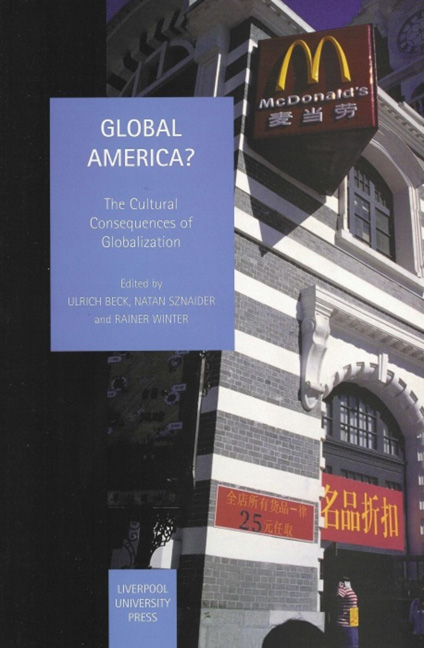Book contents
- Frontmatter
- Contents
- List of Contributors
- Acknowledgments
- Introduction
- PART I THEORETICAL PERSPECTIVES
- PART II NATIONAL CASE STUDIES
- PART III TRANSNATIONAL PROCESSES
- 8 Techno-Migrants in the Network Economy
- 9 The Americanization of Memory: The Case of the Holocaust
- 10 From the Lisbon Disaster to Oprah Winfrey: Suffering as Identity in the Era of Globalization
- 11 Global Media, Cultural Change and the Transformation of the Local: The Contribution of Cultural Studies to a Sociology of Hybrid Formations
- 12 ‘Rockization’: Diversity within Similarity in World Popular Music
- 13 The Internet: An Instrument of Americanization?
- PART IV EPILOGUE
- Rethinking Americanization
11 - Global Media, Cultural Change and the Transformation of the Local: The Contribution of Cultural Studies to a Sociology of Hybrid Formations
from PART III - TRANSNATIONAL PROCESSES
- Frontmatter
- Contents
- List of Contributors
- Acknowledgments
- Introduction
- PART I THEORETICAL PERSPECTIVES
- PART II NATIONAL CASE STUDIES
- PART III TRANSNATIONAL PROCESSES
- 8 Techno-Migrants in the Network Economy
- 9 The Americanization of Memory: The Case of the Holocaust
- 10 From the Lisbon Disaster to Oprah Winfrey: Suffering as Identity in the Era of Globalization
- 11 Global Media, Cultural Change and the Transformation of the Local: The Contribution of Cultural Studies to a Sociology of Hybrid Formations
- 12 ‘Rockization’: Diversity within Similarity in World Popular Music
- 13 The Internet: An Instrument of Americanization?
- PART IV EPILOGUE
- Rethinking Americanization
Summary
To the memory of Karl Hornung (1903–1971)
The US-dominated mass culture is mainly viewed in a negative light. From time to time, it is even damned apocalyptically as one of the principal threats to modern society. Looking at it in this way, mass culture can cause conformity, passivity, political apathy, racism and violence. The globalization of products, coming primarily from the USA, is said to bring about the creation of a standardized and stereotyped culture by spreading the same ideas and myths across the world. This is emphasized by the process within the culture industry of focusing on American lifestyles, which are offered as a model for self-presentation to the entire world. Beyond this, it is said that the worldwide diffusion of mass culture is destroying the uniqueness of regional cultures. As far as Europe is concerned, according to Stefan Müller-Doohm in his overview of this pessimistic evaluation, this is destroying the broad base of the European culture of Enlightenment, whose place is being taken by the internationally standardized mass production of popular culture (Müller-Doohm 1993: 593ff).
New theoretical works and empirical investigations contradict this understanding of popular culture as mass culture, which was largely marked by a nostalgic understanding of the modern age. My thesis is that the current global media culture cannot be adequately understood within this negative framework. It loses sight of the dynamism, differentiation and pluralization of popular culture spread by the media as well as the practices and productivity of the consumers. Recent works emphasize that global culture is not simply a standardized culture across the world (cf. Featherstone 1995; Kellner 1995; Winter 1995; Tomlinson 1999; Lull 2001). They point out that consumption of media products often leads to the opposite of this standardization. In the following, I would like to show, using a cultural studies approach, how the reception and appropriation of global media products in various local contexts is shaped by difference, syncretism and hybridity.
Rambo and the Ideology of ‘Global America’
When the globetrotter and writer Paul Theroux (1992) visited the Solomon Islands, he found that Rambo was a folk hero on one of the islands and that even isolated villagers used a generator to power a video recorder to show the films. Even in Burma and in many other parts of South and East Asia, Rambo has become a popular figure (cf. Iyer 1989).
- Type
- Chapter
- Information
- Global America?The Cultural Consequences of Globalization, pp. 206 - 221Publisher: Liverpool University PressPrint publication year: 2003



